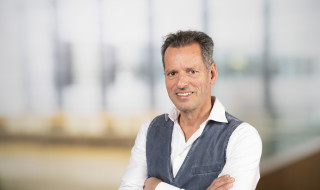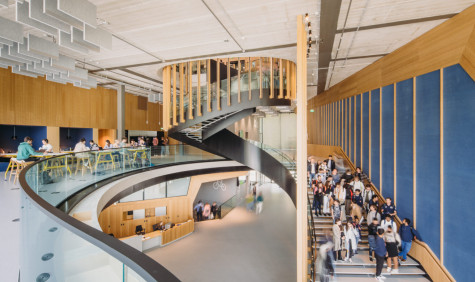"Actions that don't make money directly you can also translate into a price - something that people understand more easily"
Towards CO2-neutral IT: ten tips from TU Delft
TU Delft aims to be completely CO2-neutral and circular by 2030. IT, AI and data management play an important role in this effort. Because on the one hand, data centres guzzle energy, but on the other, you can also use smart technology to make them more sustainable. Sustainability coordinator Andy van den Dobbelsteen of TU Delft shares ten tips.
1. Smarter computing
"Hardware, software as well as usage could be much more efficient. I am not a programmer myself, but I understand that many programs we use are sub-optimal versions of what they could be, because they have been constantly modified over the years. If you take the time to reprogram all the algorithms, you can save energy. In addition, you may want to reflect on your data storage. Don't store anything and everything, because that takes up a lot of server space and therefore energy."
"In the field of computer science, fortunately, they are working on this. In the Faculty of Electrical Engineering, Mathematics and Computer Science, they teach how to program smarter, and in Physics they work on computers that process data faster and more efficiently. But scientists working with computer systems without knowing the ins and outs of software and hardware have little insight into their energy consumption. It would be good to have more figures on that, so you can see in real time how much you are using. That awareness needs to grow."
2. Create a digital twin of your energy system with AI
"Peter Palensky and Pedro Vergara's research group is building a digital twin of the energy system on campus to get more insight into usage. A digital twin combines simulations with real-time measurements so that the simulations become increasingly precise. After a few years of measuring, artificial intelligence can take over. Then you get a predictive system: if we turn this dial, what will it mean for gas and electricity use on campus?"
3. More home working and distance education
"In my PhD research, I investigated whether working from home, then called teleworking, would have a positive impact on the environmental performance of office buildings. It turned out to be so because you save on commuting. But it only really has a big effect if we then also start using fewer buildings, i.e. make the buildings smaller or share the space with more people. I am curious, though, about the effect of more online meetings and online events, or travel movements versus data traffic. That would also deserve another study."

Sustainability coordinator Andy van den Dobbelsteen: "We are building our own heat network on the South Campus with a thermal storage system, storing waste heat in the ground."
4. Recycle electronic waste
"I just moved house and came across a TU laptop and a TU phone, which I never handed in. Actually, handing them in should be standard. We need to organise this even better at TU so that valuable metals can be reused. I also think we need to move towards longer use of devices. It's actually very weird if you can get a new mobile phone after two years, even if the old one still works fine."
5. Make agreements with suppliers
"As a university, we obviously don't have the facilities to reprocess those raw materials, so we want to agree in a new procurement policy that suppliers take back and recycle used products. Suppliers who don't want to take back their own products really shouldn't be trusted, then there is something wrong with their product or business philosophy."
6. Reuse waste heat from your data centre
"At our South Campus, we are now seriously looking into that. There are two data centres there, one from TU Delft and one from a commercial party, which have the same problem: they use a lot of energy, need a lot of cooling, and the waste heat is blown into the air. This is wasted energy that also contributes to the warming of the city in summer. That is why we are going to build our own heat network on the South Campus with a thermal energy storage system, storing waste heat in the ground. One data centre can heat an entire neighbourhood."
7. Replace diesel generators providing emergency power in data centres
"A researcher we recruited for this purpose is comparing various alternatives, including batteries, hydrogen, a flywheel and biofuels. It's not that we burn staggering amounts of fuel for that backup power, but it's also symbolic: it should lead to overall replacement of fossil energy and to understanding the best way to store energy."
8. Involve the whole community: top-down as well as bottom-up
"There is a lot of knowledge about energy usage in the workplace, but it is also important to get the commitment from the board of directors and that they make resources available. We had to provide a good rationale for our plans. After a tour of all kinds of departments, faculties, staff and students, we first drew up an action plan, which the board approved."
"Next, we worked out how much investment was needed, and that was also approved by the board. We have a total budget of 100 million euros to make the campus more sustainable. Of that amount, 95 million goes to buildings, facilities, green management and hardware, and 5 million is for events, studies and policy adjustments to encourage behavioural change."
"Saving energy also saves money, of course. The new Echo education building produces slightly more energy than it uses. Investing in solar panels and other forms of energy savings pays for itself in a few years. But some things are not so easy to monetise. Circular or natural materials are more expensive but have a positive effect on CO2 emissions and biodiversity. CO2 offsetting by planting forests also costs money. So that way, you can still translate this too into a price, something people can easily understand. Then it becomes attractive to also do things that do not directly generate money."
9. A theme team helps to map everything out
"When I started, I formulated twelve themes that are important to address sustainability on campus, including IT, AI and data management. I invited scientists and IT support staff to think along in a theme team. We are now three years on and all themes have been incorporated into the organisation. IT staff and data managers now have to work on reducing their energy consumption themselves. Deans and directors have also been instructed by the board of directors to pay attention to this and for this purpose, we have appointed local sustainability coordinators in every faculty and department."
10. Numbers are knowledge
"I strongly believe in that. Firstly, to see where we stand. But I also want to know: are the actions we take having an effect? The energy consumption of all our buildings is monitored, but in Laure Itard's Brains 4 Buildings project, this is now measured in much more detail. We make a CO2 report every year, and then we also see whether things are progressing sufficiently. Because TU is growing, we see that energy use as a whole is not going down yet, but per person it is."
Read more:
- https://www.tudelft.nl/en/sustainability/it-data-management-ai
- https://www.tudelft.nl/en/sustainability
Text: Josje Spinhoven
Header photo: The energy-generating Echo building (photo Evabloem)
